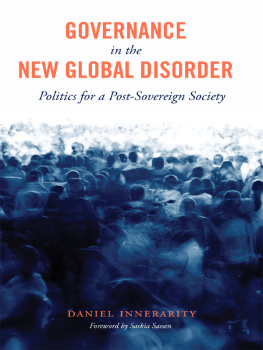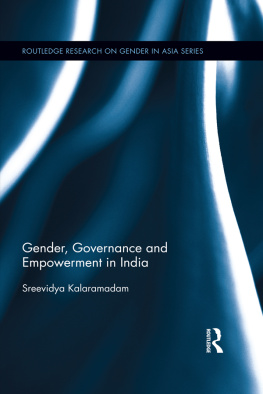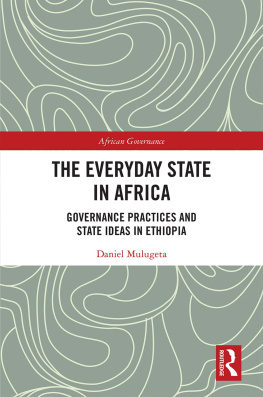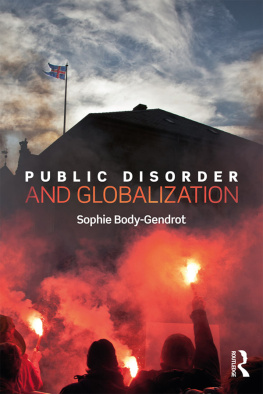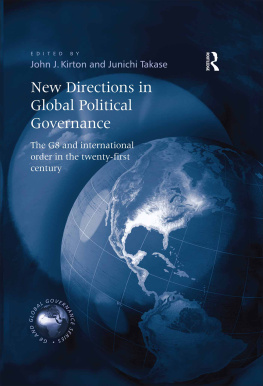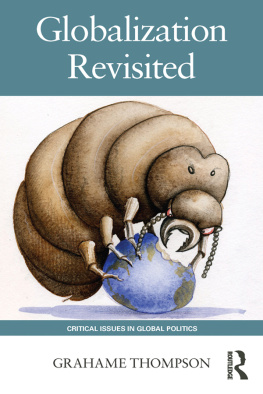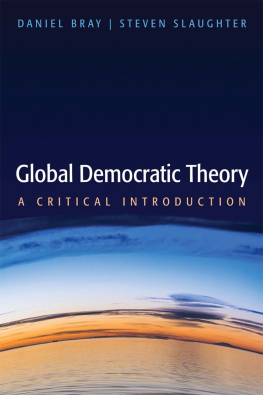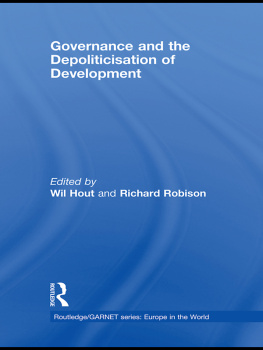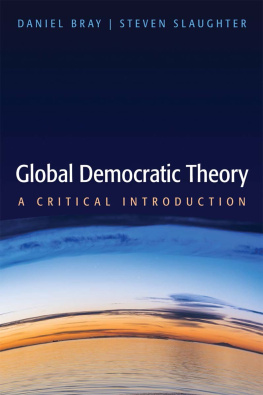Table of Contents
GOVERNANCE in the NEW GLOBAL DISORDER
GOVERNANCE in the NEW GLOBAL DISORDER
Politics for a Post-Sovereign Society
DANIEL INNERARITY
Translated by
SANDRA KINGERY
Foreword by
SASKIA SASSEN
Columbia University Press New York
Columbia University Press
Publishers Since 1893
New York Chichester, West Sussex
cup.columbia.edu
Copyright 2016 Columbia University Press
All rights reserved
E-ISBN 9780-2-315-4225-8
Library of Congress Cataloging-in-Publication Data
Names: Innerarity, Daniel, 1959 author. | Kingery, Sandra, 1964 translator.
Title: Governance in the new global disorder: politics for a post-sovereign society / Daniel Innerarity; translated by Sandra Kingery; foreword by Saskia Sassen.
Description: New York: Columbia University Press, 2016. | Includes bibliographical references and index.
Identifiers: LCCN 2016018541| ISBN 9780231170604 (cloth: alk. paper) | ISBN 9780231542258 (e-book)
Subjects: LCSH: International cooperation. | Globalization. | Sovereignty.
Classification: LCC JZ1318 .I5552 2016 | DDC 306.2dc23
LC record available at https://lccn.loc.gov/2016018541
A Columbia University Press E-book.
CUP would be pleased to hear about your reading experience with this e-book at .
Cover design: Martin N. Hinze
Cover image: baona/iStockphoto
CONTENTS
SASKIA SASSEN
I N this passionate and original book, Daniel Innerarity unsettles a range of typical or familiar contrasts. In this process he repositions the familiar as part of a new interpretation. Nothing is left standing where it once stood. Key categories are evicted from their conventional anchors. But it is an eviction that entails making new meanings.
As I read through this book, there was one image that kept recurring in my mind, albeit not one used by the authorit was more my applying Inneraritys method to some of my work. The image is that the immigrant makes new ground for her mobility, and thereby makes identity into a practice. Here are meanings that keep rolling, not one can stand on its own in isolation: the moment it is uttered, it generates another meaning, in a sequence that eventually puts the reader in a faraway place from where the sentence, the paragraph, the page, or the chapter started. It is not analytical anarchy, but rather analytic freedomconcepts take on nomadic meanings that keep mutating.
But these mutating meanings can also become frightening. Innerarity asks: How should we conceive of and govern a world made up of common threats and borderless sovereignties? How should we protect ourselves in limitless spaces, in a world of nets, fluidity, and connections? A beginning of an answer is that we must find a grammar that helps us see that there is no exclusive ownership, that what belongs to us is not necessarily exclusively so.... The privileged may think they can withdraw from dangers, but they cannot.
In a moment of practical observation, Innerarity argues that we cannot produce safety, and we should not promise it. Rather, we can only offer cooperative solutions, projects for greater integration, and complex forms of justice for which there are barely models or precedents. Which brings him to what is probably his core argument, call, or thesis, that what unifies us and puts us on equal footing is none other than the community of our threats, the shared risks that make it physically impossible to escape danger on our own. He tells us that we can illustrate these harsh new conditions with such conditions as the gaseous world, universal exposure, or a world without outlying areas. Each of these images points toward a shared vulnerability, a similar lack of protection, impossible immunity. The flip side of interdependence is common fragility and the fear of contagion. He posits that this is why a reasonable cultivation of fear and the management of global risks are among the most important functions of todays governments, constituting a new opportunity for political innovation.
Inneraritys answer to many of the conundrums he examines is probably well captured in the following statement: What we could call the civilizing of globalization is nothing but the reinvention of politics on a global scale in such a way that the world stops having owners and moves toward becoming a space for the citizenry.
Yet at the same time, in his relentlessly critical rather than romantic perspective, he also detects trajectories that might go in less attractive directions. Thus he posits that our maps of the world today no longer show a coherent and complete collective of self-sufficient units, but an incomplete map, with areas of ambiguous sovereignty, spaces that are difficult to regulate, and hazy responsibilities. Again, here I see Innerarity executing that language operation that recurs relentlessly, to wit, that nothing is simply what it is.
In short, the play of metaphors proposed by the author as a way of examining todays world helps clarify a range of complexities. It throws light on emergent patterns that are easily experienced as intractable.
T ODAYS world is full of paradoxes, many of which could be summarized by the idea that it is a world belonging to everyone and to no one. There are many issues that are everyones (they affect all of us and demand coordinated actions), but at the same time, no one can or wants to be in charge of them (either there is no competent authority or no one shoulders the responsibility). What is the difference between something held in common and something that is ungovernable, between shared responsibility and generalized irresponsibility? How do we distinguish that which belongs to everyone and that which belongs to no one, that which has no owner and that which is simply ignored? Are we not calling the void universal or celebrating as an opening that which is, in reality, simply vulnerability and a lack of protection?
This ambiguity is reflected in the opposing assessments with which we receive new realities. We declare the death of experts, the accessibility of information, the apotheosis of transparency, and the defeat of the need for mediation, but these very triumphs are also accompanied by the fear of deregulation, ungovernability, and opacity. Society is divided between optimists and pessimists, which is the axis on which we place ourselves when we have no idea of what is going on. Given this ambivalent perspective, who can assure us that everything we are now facing portends great success, rather than opening the doorway to disaster?
I propose we understand this new constellationthe dialectic between everyone and no oneas the condition that explains what we could, without metaphoric exaggeration, call the return of piracy in the global era. There is always piracy when new realities appear and it is not clear to whom they belong or where the competition lies. It makes sense that with the increase of universal public goodssuch as the climate, security, knowledge, or financial stabilitythere has also been growing uncertainty about their possession and management. The timid configuration of humanity as the subject and agent of appeals converts what used to be sovereign states, landowners, or unilateral actors eo ipso into pirates. The current fluidification of property corresponds with the weakening of political sovereignty in a world of interdependencies; both phenomena stem from and share the same reality. World cartography no longer establishes a coherent and complete collective of self-sufficient units, but an incomplete map, with areas of ambiguous sovereignty, spaces that are difficult to regulate, and hazy responsibilities. All of this forces us to articulate a new state of equilibrium between the state, the marketplace, and society.

